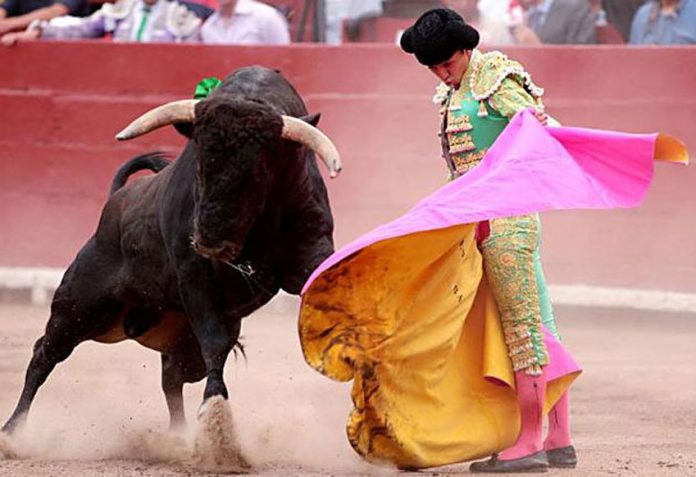“The greatness of a nation and its moral progress can be judged by the way its animals are treated.” ― Mahatma Gandhi
On a bus to another city a couple of months ago, the animated film about a peaceful, flower-loving bull named Ferdinand played on the screens.
In the movie, he runs away from a bull-raising ranch and is adopted by a little girl on a farm where he lives a blissful, peaceful existence. After an unfortunate bee sting causes him to inadvertently destroy a nearby city’s flower festival, he’s returned to the ranch where he convinces the other animals to escape once he makes them believe they will die if they fulfill their wishes of becoming great fighters, and that no alternative fate awaits them.
Toward the end, he’s roped into a fight with a famous matador, who ends up sparing him after Ferdinand himself decides not to kill the bullfighter when he has the chance. In a familiar trope, the victim becomes the merciful powerful, and he returns to his enchanted life on the farm with his friends.
My husband’s grandfather was a big fan of watching bullfights on TV, and during the time we lived close by and spent nearly every Sunday with them, I regularly ruined the experience for him with my snarky encouragement of the bulls.
If forced to choose, of course, I’ll always say a human’s life is worth more, but it’s hard to feel sorry for bullfighters who are knowingly risking their lives with the goal of taking away the life of an animal that didn’t ask to be there.
Really, I was insufferable.
As a little girl, I’d read the story of Ferdinand, and it has always stuck with me. Growing up in a mid-sized city in Texas during the 80s and 90s, bullfighting was hardly a part of my reality, but whenever the topic of animal rights would come up (and it often did — my grandmother was an ardent vegetarian), I’d think of the unfairness of that poor fictional animal being forced into fights that he didn’t want.
I didn’t think too much about the issue specifically until, as a teacher at an American school in Querétaro, one of the required books in a literature class I taught was Ernest Hemingway’s The Sun Also Rises.
In speaking about it, Hemingway said that his initial goal was to describe the perfect bullfight. The book was by no means an appropriate choice for ninth-graders, but it did at least force me to examine why people might be intrigued by a bullfight: humans seem to seek out witnessing dangerous, heart-pounding experiences, and what’s more terrifying and thrilling than watching a 2,000-pound animal charge someone?
Still, though, you’d think we could find something that didn’t necessarily result in the death of at least one of the participants.
In Mexico, bullfighting seems to be on the way out in an increasing number of states, the use of circus animals has been banned and frequent challenges to cockfighting and other morally questionable forms of entertainment at the expense of animals abound.
Major cities now have vegetarian and vegan restaurants and laws against animal cruelty, though not always enforced, are on the books.
My own relationship with animals is complicated. I was a vegetarian for years, but stopped twice: once when I first moved to Mexico, unwilling to face the prospect of turning my nose up at what my hosts would surely be offering.
When I realized that actually being a vegetarian in Mexico is perfectly acceptable (and having given an ethics class that required research about animal rights), I abandoned animals-as-food a second time. I started eating meat again, however, after my daughter was born, having decided to test the extent to which it would give me more energy in the face of scant sleep and a poor and haphazard diet.
It didn’t really, but I’d gotten into the habit of eating it again, and have yet to renew my own personal ban.
Basically, I’m a hypocrite. Especially when it comes to animals, though, we all are. We scoff at stories from China of dogs being sold for meat, but why is that worse than killing other animals for meat? And besides, it’s not like everyone treats dogs well here either, with even the ones with homes being relegated to a life of isolation on roofs when the owners figure out that dogs don’t simply train themselves to behave in ways that humans desire.
I eat a slab of pork, from an animal much smarter than my own pets, with my loved and cared-for dogs sitting at my feet. I don’t encourage the use of animals for entertainment, and certainly not their torture and killing for our viewing pleasure.
But am I that much more ethical when I freely choose to eat animals that have been raised and killed on my behalf?
We humans, really, are just the worst.
What do we owe the animals in our care, especially the animals that would not choose to be in our care if they had the choice? When it comes to our diets, I don’t have the answers.
I know in my heart that our system of raising them for food is not right, not because eating something that was alive is wrong, but because our way of getting them is just not fair competition, and causes a host of other environmental problems to boot. But I certainly don’t have a roadmap for turning around our current system.
At the very least, we can continue our march toward making the outright abuse of animals for entertainment and profit illegal. Mexico has done a lot toward this goal, but still has a way to go. There are real Ferdinands (and Fidos) out there counting on us!
Let’s throw in some Meatless Mondays, and we’ll be on our way.
Sarah DeVries writes from her home in Xalapa, Veracruz.
